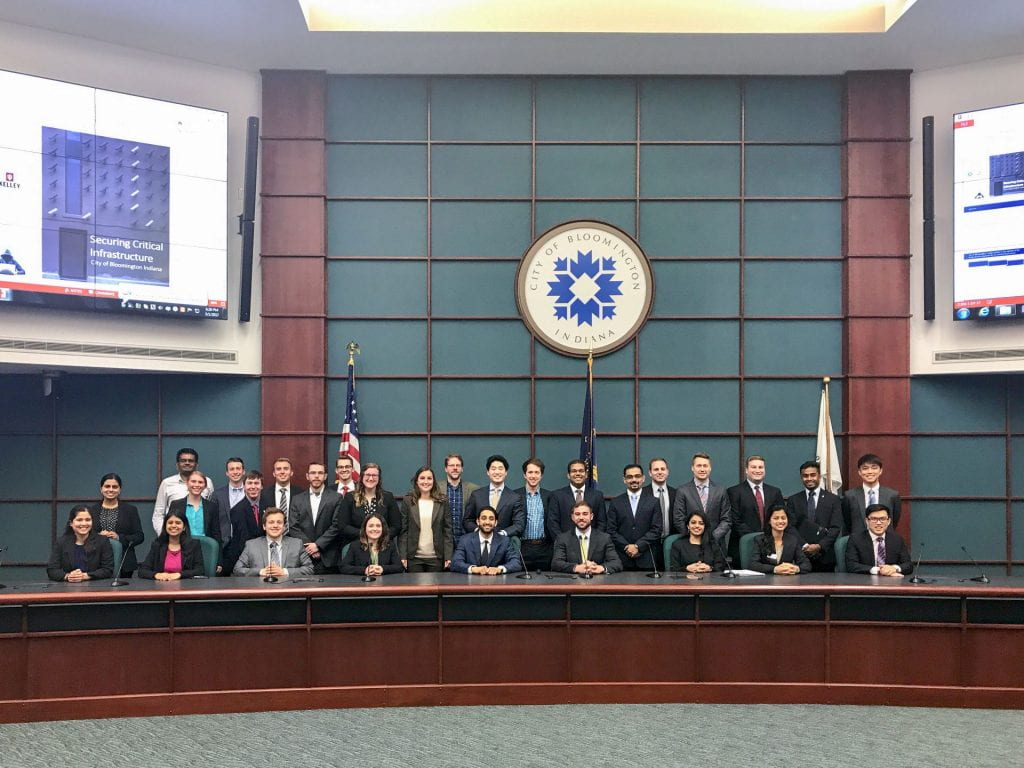
BLOOMINGTON, Ind. – Amid escalating cyber attacks worldwide against all kinds of public and private institutions and individuals, an independent NGO – the Cyber Peace Institute – was established Sept. 26 in Geneva, Switzerland to address their impact and risks.
Among those helping to frame the organization’s goals and objectives are Indiana University and a professor in its Kelley School of Business.
Scott Shackelford, associate professor of business law and ethics in IU’s Kelley School of Business, chair of the Cybersecurity Program IU Bloomington and director of the Ostrom Workshop Program on Cybersecurity and Internet Governance, is one of new NGO’s strategic partners. Also involved are academics at other research institutions, such the University of Toronto, Harvard and Stanford universities and the Massachusetts Institute of Technology.
“In a world beset by cyber insecurity, it is important to build ties, and ultimately trust, such as through the establishment of norms of behavior,” said Shackelford. “Discussions are ongoing on this front across numerous forums, including the UN, but they are disparate.
“The concept of cyber peace has the potential to link together discussions ranging from making democracy harder to hack to holding cyber criminals responsible for spreading ransomware. A whole ecosystem is needed to support this effort, including academia and civil society such as the Cyber Peace Institute,” he said.
Stéphane Duguin, head of the EU Internet Referral Unit within Europol, who was instrumental in creating Europol’s European Cybercrime Centre, is leading the CyberPeace Institute as CEO. Marietje Schaake, a recent member of the European Parliament now affiliated with Stanford University’s Cyber Policy Center, will be its first president.
Cyberattacks are of great concern for business and government leaders. Recent victims worldwide of attacks by hackers have included the Georgia State Police, suppliers for airplane maker Airbus and the Australian parliament. Many executives see them as a deeper threat than economic uncertainty, regulation and hits to brand reputation.
The Cyber Peace Institute’s initiating funders include two organizations well connected to IU, Microsoft and the Hewlett Foundation, the latter of which has supported university efforts in this area. IU was the first and remains the only university to receive funding from Hewitt to support cybersecurity research activities.
 With its deep bench of scholars exploring the technical, legal, and business dimensions of global cybersecurity risk management, IU has become an academic epicenter for research in cyber peace. Shackelford (pictured left) helped coin the term through his 2013 book, “Managing Cyber Attacks in International Law, Business, and Relations: In Search of Cyber Peace.”
With its deep bench of scholars exploring the technical, legal, and business dimensions of global cybersecurity risk management, IU has become an academic epicenter for research in cyber peace. Shackelford (pictured left) helped coin the term through his 2013 book, “Managing Cyber Attacks in International Law, Business, and Relations: In Search of Cyber Peace.”
IU also is unique in offering a multi-disciplinary degree program – the M.S. in Cybersecurity Risk Management — that leverages the expertise of three IU schools, the Kelley School, the IU School of Informatics and Computing and the Maurer School of Law. Kelley also offers a unique graduate certificate in cybersecurity management and a digital badge in global cybersecurity foundations.
The Ostrom Workshop Program on Cybersecurity and Internet Governance has 80 affiliates worldwide, who are doing groundbreaking cybersecurity research, including in the realm of cyber peace. It will co-host a conference at New York University’s Center for Global Affairs on Nov. 22, with a follow-up conference next April at IU Bloomington, to help establish a research agenda for the field.
Shackelford is author of the forthcoming Cambridge University Press book, “Governing New Frontiers in the Information Age Toward Cyber Peace.”
IU is also home to the groundbreaking IU Cybersecurity Clinic, which is the first clinic of its kind in the nation to focus on protecting critical infrastructure, including local governments, utilities, small businesses, and non-profits.
Involvement in initiatives such as the Cyber Peace Institute also benefit students, who are able to partner with clients around the world, providing them with important value, and gaining experience. This spring, a group of faculty and students traveled to Canberra, Australia for a collaborative workshop on election security. A similar project with NATO is underway, another soon in the nation of Estonia. They also include communities and municipalities, such as the city of Bloomington (pictured below).
“We will be working with other such centers around the world as part of a common effort to improve cybersecurity due diligence, and promote cyber peace,” Shackelford said. “A world of opportunity awaits, and our participation in the Cyber Peace Institute will help unlock it.”
